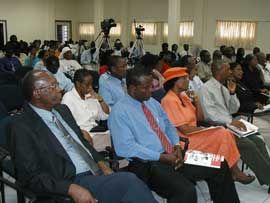POVERTY DOWN

The Unity Labour Party administration has reduced poverty and improved the quality of life of people here through the creation of quality jobs.
This was the assessment made by Prime Minister Dr. Ralph Gonsalves Wednesday as he presented a virtual report card on poverty alleviation at the Methodist Church Hall in Kingstown.{{more}}
The Prime Minister emphasized that the range and extent of government services had grown both in quantity and quality while a revolution in education was being achieved. He also pointed to physical infrastructure being advanced “by leaps and bounds” as he attempted to show the achievements of his four-year old administration.
With general elections constitutionally due by July 2006, Dr. Gonsalves was eager to show that, on the question of poverty alleviation, his government had a stellar record when compared to their predecessors the New Democratic Party (NDP).
“When the ULP arrived in office after the general elections,” he said, “having defeated the New Democratic Party, which held the reins of government for an unbroken 17 year period, it met mass poverty in St.Vincent and the Grenadines.”
Dr. Gonsalves said that the society inherited was “not kind and was not gentle” a direct reference to NDP leader and former Prime Minister Arnhim Eustace who has often called for a kinder and gentler society but that it was suffering from mass poverty.
He said that “very little, if anything, had changed for the better from the damning assessment made in 1996 by the officially-appointed Kairi Consultants from Trinidad who produced a study entitled Main Report â Poverty Assessment Report â St.Vincent and the Grenadines.”
Dr. Gonsalves presented some facts and figures on poverty which he said faced his administration in 2001 when it came to office. He said that 37.5 per cent of the population or some 43, 875 persons were poor; 25.7 per cent of the population or 30,069 persons were classified as indigent poor while 30.6 per cent of households lived in poverty; 20.4 per cent lived in indigent poverty and the number of indigent poor in St.Vincent and the Grenadines was the highest proportionately of the population compared to all other English-speaking Caribbean countries.
The years 2001-2004 were described by the Prime Minister as the most challenging for the economy of St.Vincent and the Grenadines, since Independence.
The central challenges, he said, however, have not been of the Government’s making. “They have come to us from outside; they have been external to us. These challenges arose from external shocks,” he said.
The Prime Minister went on to inform the gathering at the forum, which was being carried live on radio, that despite these shocks, the economy of St.Vincent and the Grenadines since 2001 had achieved real growth without volatility because of the policies that were put in place.
“In each year, from 2001 onwards,” Dr. Gonsalves disclosed, “the economic growth performance of St.Vincent and the Grenadines has been much better than average for the member countries of the Eastern Caribbean Currency Union (ECCU).”
He noted that in 2001, St.Vincent and the Grenadines had statistically zero growth; in 2002, 3.2 per cent real growth; in 2003, 3.4 per cent real growth; and in 2004, the estimates were 5.4 per cent real growth.”









